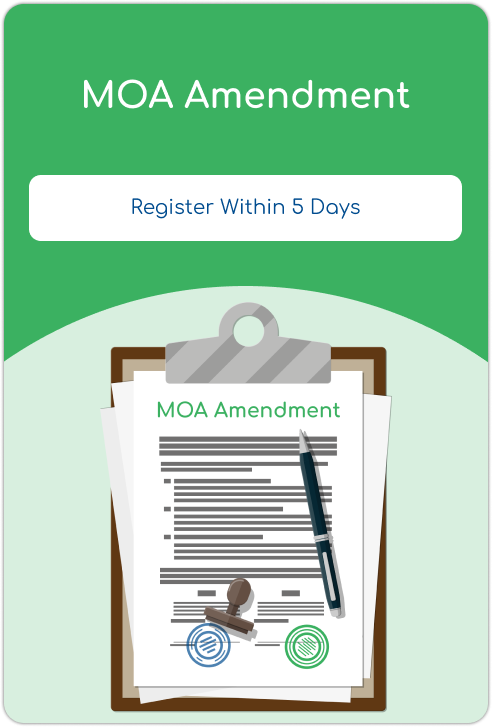
MOA Amendment
243 customers
What will you get?
MOA Amendment
What do we Require?
INR 11055 Taxes As Applicable



Introduction
The MOA Amendment, or Memorandum of Association Amendment, involves modifying the provisions outlined in a company's MOA. This process is permissible under Section 13 of The Companies Act, 2013, in conjunction with the Company Rules Act, providing the legal framework for such modifications. Companies frequently need to amend their MOA as they evolve to accommodate changes in objectives, operations, or governance structure.
Memorandum of Association (MOA):
The Memorandum of Association, commonly known as the MOA, serves as the cornerstone document for any company. Crafted during the company registration process, it carries substantial legal weight, outlining the company's fundamental objectives, operational limitations, and internal regulations. Essentially, the MOA constructs a blueprint for the company's operations, delineating its scope and defining its relationship with shareholders. It encapsulates various facets of the company, including its operations, delegation of responsibilities, policies, and guiding principles, providing a comprehensive framework for its governance and conduct.
Reasons:
An MOA can typically be amended at any point during the life of the company, provided that the changes comply with relevant legal requirements and a procedure outlined in the company’s governing laws or regulations. Common reasons for amending an MOA include alterations to the company's objectives, operational scope, authorized capital, or shareholder details. Amendments may also be necessary in response to changes in regulatory requirements or to accommodate strategic shifts in the company's direction. The specific process for amending an MOA typically involves obtaining approval from relevant stakeholders, such as shareholders or board members, and filing the amended document with the appropriate government authorities for legal recognition.
Key amendments to the Memorandum of Association (MOA)
typically involve changes that affect the fundamental structure, objectives, or operations of the company. Some common key amendments to the MOA include:
- Change of Name:One of the most common amendments is changing the name of the company. This could be due to rebranding efforts, mergers, acquisitions, or other strategic reasons.
- Change of Registered Office:Companies may need to amend their MOA to reflect a change in the registered office address. This could be due to relocation or expansion into new territories.
- Alteration of Object Clause:The object clause outlines the main objectives and purposes for which the company is formed. Amendments to this clause may be necessary to reflect changes in the company's business activities, expansion into new markets, or diversification of operations.
- Amendment of Capital Clause:Changes to the capital clause may involve increasing or decreasing the authorized share capital of the company, issuing new shares, or altering the rights attached to existing shares.
- Modification of Liability Clause:The liability clause defines the extent of liability of the company's members. Amendments to this clause may involve converting a company from limited liability to unlimited liability or vice versa.
- Alteration of Articles of Association:While the MOA sets out the company's fundamental objectives, the Articles of Association (AOA) govern its internal management and administration. Amendments to the AOA may be necessary to update provisions related to directors' powers, shareholders' rights, meetings, and decision-making processes.
- Change in Shareholders' Rights:Amendments to the MOA may be required to modify the rights, privileges, or restrictions attached to different classes of shares, such as preference shares or ordinary shares.
- Other Regulatory Compliance Requirements:Amendments may also be needed to ensure compliance with changes in regulatory requirements, such as amendments to company law, tax regulations, or industry-specific regulations.
Documents Requirements:
- Resolution:A board resolution authorizing proposed amendments to the MOA.
- Amended Memorandum of Association:A copy of the amended MOA reflecting the proposed changes.
- Special Resolution:A copy of the special resolution passed by shareholders in some jurisdictions.
- Minutes of Meeting:Evidence of the decision-making process and may be required by regulatory authorities.
- Application Form:A formal application form prescribed by the relevant government authority for requesting approval of the MOA amendments.
- Payment Receipt:Proof of payment for any fees or charges associated with the MOA amendment process.
- ID and Address Proof:Identification and address proof of the authorized signatories submitting the amendment application.
- Additional Documents:Depending on the jurisdiction's requirements or the nature of the proposed amendments.

